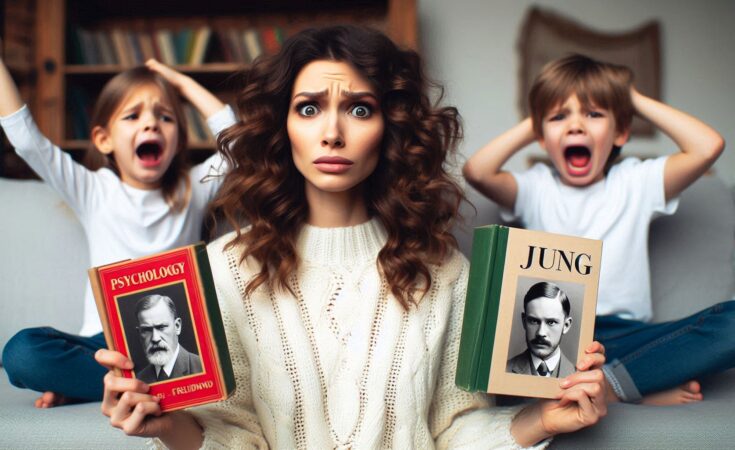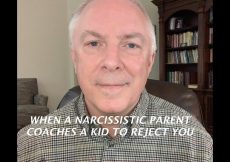by Céline Baron, sophrologist and psychopractitioner based in Vichy, France.
Freud and Jung, two pioneers of psychology, have left us an enduring legacy that still resonates in how we approach parenting today. Although both thinkers diverged on certain aspects, they share invaluable insights for guiding children in ways that acknowledge their complex inner worlds. For parents, applying these ideas can foster a more profound connection with their children and encourage genuine personal growth.
From my perspective, Freud’s contributions stand as the bedrock of psychological understanding. Despite criticisms, psychoanalysis remains a powerful tool for exploring the subconscious, either with a therapist or, to some extent, independently through self-reflection and guided reading. Newer branches of psychology often repurpose ideas that Freud and Jung had already explored deeply, without adding genuinely revolutionary ideas. Let’s dive into the ways parents can apply these timeless insights in their everyday lives.
Freud’s Insights on Parenting: Embracing the Inner World of the Child
Freud believed that our early experiences profoundly shape who we are. He emphasized the importance of understanding a child’s subconscious mind, which can manifest in dreams, behaviors, and symbolic play. Freud’s concept of the “id,” “ego,” and “superego” offers a framework for understanding children’s desires, rules, and the ongoing process of balancing their needs with the expectations of others.
For instance, suppose a child repeatedly takes toys from their peers without permission. Rather than viewing this behavior as “bad,” Freud would suggest looking deeper: is this a manifestation of unmet desires or frustration? Parents could approach the situation by recognizing the child’s “id” impulses, acknowledging that their needs are genuine, and then guiding them to express these impulses in a socially acceptable way.
Freud also introduced the idea of the “Oedipus complex,” which reflects a child’s attachment to their opposite-gender parent and rivalry with the same-gender parent. In a modern context, this can be understood as a phase of natural dependency and emotional attachment that children experience. Rather than becoming uncomfortable or punitive about this, parents can support their children through this stage by setting clear boundaries while ensuring emotional security.
To apply Freud’s ideas at home, consider a real-world scenario: imagine a child acting out when a younger sibling is born. The older child may feel threatened, perceiving the new sibling as competition for parental love. Rather than scolding, a “Freudian” approach might involve validating the child’s feelings: “It’s hard when things change, and you feel like you have to share our love.” This response acknowledges the subconscious fear, allowing the child to express it safely. Alas, within a family, I have observed such frustrations in adults… What particularly shocked me was the case of a mother, the eldest sibling, who was incapable of accepting that her younger sisters were becoming mothers themselves. What would Freud have thought of that? For this woman, the idea that her younger sisters could have intimate relationships and also bear children was unthinkable. This led to an open conflict that lasted 40 years, not only with her younger sisters but also with her nieces—a conflict that only ended when the rest of the family decided to distance themselves from her. From a Freudian perspective, the behavior of this elder sister could be explained by complex unconscious dynamics related to sibling rivalry and issues surrounding maternal identity. Freud often explored how sibling relationships and unconscious desires influence behavior, and he would likely have seen this refusal to accept her younger sisters’ motherhood as a conflict rooted in feelings of envy, rivalry, and ambivalence linked to the elder sister’s place within the family. As the eldest, this woman likely held a dominant and protective role within her sibling group, a valued and distinctive position. In this context, seeing her younger sisters become mothers could have felt like a threat to her own identity and to the unique status she held within the family. Freud often noted how an eldest sibling can feel a mix of intense love and rivalry toward their younger siblings, especially when they feel dispossessed or put on an equal footing. In this case, the inability to accept the younger sisters’ motherhood could reveal an unconscious desire to maintain her supremacy and uniqueness as the “mother” or dominant figure.
Jung’s Approach: Encouraging Individuality and Creativity in Children
Carl Jung, who diverged from Freud in significant ways, believed that each child has a unique “self” that unfolds throughout their life. Jung emphasized the importance of helping children connect with their “self” through dreams, imagination, and creativity. He saw childhood as a crucial period for discovering and understanding one’s inner drives, often through myth and symbolism.
For Jung, fostering a child’s imagination was essential. He would suggest that instead of strictly steering children’s activities, parents allow for unstructured play and creativity. For instance, if a child is fascinated by stories of knights and dragons, Jung might see this as a symbolic way of exploring courage and confrontation. By encouraging these interests, parents can nurture qualities like bravery and resilience, while also helping children connect with their deeper selves.
A Jungian approach also values the role of archetypes—universal symbols that shape our thoughts and behaviors. For example, a child might act out a “hero” archetype by taking on challenges or a “nurturer” role by caring for pets or younger siblings. Observing and nurturing these archetypes can provide children with a sense of purpose and identity, allowing them to grow in a way that aligns with their authentic selves.
To apply Jung’s ideas practically, consider allowing a child who loves drawing and storytelling to explore those activities without strict guidelines. Encouraging children to express themselves freely can be a powerful way of helping them connect with their inner world and cultivate a healthy sense of self. This approach not only allows them to flourish creatively but also builds confidence and emotional resilience.
Applying Freud and Jung’s Ideas to Modern Parenting
Freud and Jung remind us of the importance of understanding not just a child’s behavior, but the emotions and unconscious motivations driving it. Modern parents can benefit from these perspectives by paying close attention to their children’s inner worlds and fostering an environment where they can express themselves.
Here are some ways parents today can integrate Freud and Jung’s ideas:
- Create a Safe Space for Emotions: Just as Freud emphasized the importance of acknowledging the subconscious, parents can foster an environment where children feel safe expressing all emotions, including anger and sadness. Rather than disciplining children solely based on their actions, try discussing the feelings behind them. This can help children feel validated and understand themselves more deeply.
- Encourage Imaginative Play and Creativity: Jung believed in the value of exploring one’s inner world through creativity. When a child is interested in dressing up, creating stories, or engaging in role-play, let them. This freedom supports their growth as unique individuals and allows them to develop resilience by exploring different aspects of their identity.
- Use Storytelling as a Teaching Tool: Both Freud and Jung recognized the power of symbols and stories. For example, if a child struggles with fear, telling a story about a brave character who faces a similar challenge can help the child see themselves in that character, indirectly addressing their own fears.
- Model Personal Growth: Freud, in particular, stressed that adults who face their own internal conflicts are better equipped to help others, including their children. Parents who reflect on their own unresolved issues, whether through therapy, reading, or self-analysis, are better able to nurture their children without projecting personal anxieties onto them. By doing this inner work, parents can approach challenges calmly, offering support rather than judgment.
Embracing Psychoanalysis as a Tool for Self-Growth in Parenting
Ultimately, both Freud and Jung saw self-understanding as key to personal evolution. For parents, this means that the more we resolve our inner conflicts, the more effectively we can parent. Psychoanalysis, when practiced either with a therapist or independently, offers tools to understand these deeper layers within ourselves. It is only when we confront and resolve our issues that we can truly guide our children without allowing unresolved aspects of ourselves to interfere.
In a world of ever-evolving parenting theories, Freud and Jung’s insights remind us of the timeless nature of human development. They offer pathways to understand and support our children’s journeys, allowing us as parents to facilitate not just their growth, but our own.


































